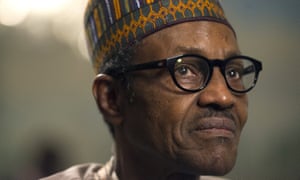
Nigerian president, Muhammadu Buhari, while being interviewed in Washington in June 2014.
Photograph: AP
Nigerian authorities have seen documents suggesting that the proceeds
from past crude oil sales were diverted to personal accounts instead of
reaching government coffers, the president, Muhammadu Buhari, said on
Wednesday.
Africa’s biggest economy faces its worst economic crisis in years,
since it relies on oil exports for about 58% of government revenue. The
sharp fall in oil prices over the past year has hit those revenues hard.
The problem has been exacerbated by the longstanding mismanagement of
oil revenue.
Buhari has previously said treasury coffers were virtually empty when
he took office in May and that “mind-boggling” sums of money had been
stolen.
The 73-year-old former military ruler, who won April elections after
campaigning on an anti-corruption ticket, outlined progress made by his
government in a two-hour “media chat” with three journalists broadcast
live on state television.
“We have some documents where Nigerian crude oil was lifted
illegally and the proceeds were put into some personal accounts instead
of the federal government accounts,” he said.
He added that some stolen money had already been recovered by the
government, but did not disclose the sums involved and said he could not
provide more details because various cases were being taken to court.
The president answered questions on a wide range of topics, from
security to the economy, and from unemployment to the kidnapping by Boko
Haram of 200 school girls from the town of Chibok in April 2014.
Buhari said the government was prepared to hold talks with the
Islamist militant group in a bid to secure the girls’ release. “If a
credible leadership of Boko Haram can be established and they tell us
where those girls are, we are prepared to negotiate with them without
any preconditions,” he said.
However, he said there was no firm intelligence on the whereabouts of
the girls, whose abduction in April 2014 prompted an international
outcry, or whether they are still alive.
Boko Haram have been waging a six-year campaign to create an state of Islam in northern Nigeria.
More than 1,000 people have been killed in attacks by suspected Boko
Haram militants since Buhari took office. In the latest flare-up, two
suicide attacks killed at least 48 people on Monday.
The president also reiterated his belief that Nigeria’s currency
should not be devalued further, despite the central bank’s growing
struggles to keep the naira at current levels. Instead he backed
measures imposed by the central bank to restrict access to foreign
exchange, which have not gone down well with investors.
“The foreign currency restrictions cannot be lifted because the money is not there,” the president said.
No comments:
Post a Comment